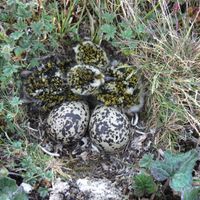ABOVE: American golden plover (Pluvialis dominica) in Barrow, Alaska
VOJTECH KUBELKA
An analysis of more than 38,000 shorebird nests hailing from all seven continents reveals that rates of nest predation in the Arctic are now greater than they are in the tropics. Typically, egg-thieving is low in the far North, likely a reason that some species migrate toward the poles to lay their eggs.
In the last 70 years, predation is up two-fold in northern temperate zones and three-fold in the Arctic, according to research published yesterday (November 8) in Science. This uptick in predation is linked to higher and more variable temperatures and is likely a factor in the overall declines seen in many shorebird populations, the authors suggest.
Interested in reading more?







